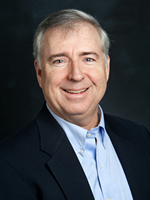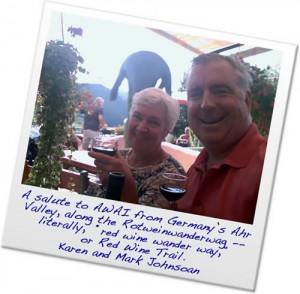
One of the things I like best about Mark Everett Johnson is that he’s terrifically approachable — despite his highly-impressive writing career. He’s the kind of guy who can be slated as a key speaker at a major writing conference one day, yet spends all the other days sitting in sessions, side-by-side with working writers and taking copious notes.
Mark started off like a lot of us. He had the desire to write for a living and hoped it could be about something he enjoyed. For him, that meant politics and economics. That’s when a friend introduced him to a totally novel approach to writing in the form of a direct mail agency.
Intrigued, Mark dove in and learned the craft. From writing self-mailers to postcards to good, old-fashioned letters, he mastered the art of persuasive writing and built up his career as proof of what he could do. Even better, he did it with no degree to speak of.
Along the way, Mark rubbed shoulders with many of the top experts in the industry — and he’s been smart enough to stop and listen to each one. He’s carved out a writing path for himself that includes writing promotional letters to sell subscriptions. In fact, Mark is credited with writing one persuasive letter that sold over 4 million subscriptions to a health newsletter from the Mayo Clinic.
These days, Mark has experience writing about everything from onions to bullion, and has reaped plenty of perks (including international travel) thanks to his copy skills.
I connected with Mark from his home office in Pennsylvania on a relaxed Tuesday afternoon. I couldn’t help but appreciate his genuine enthusiasm and willingness to share insight into the possibilities for accomplishment in the world of professional writers.
Not only that, but he was particularly honest about his path to success — especially when he confessed an initial wild fear of public speaking (he’s terrific at it now, I can attest!).
I hope you’ll enjoy the following account of Mark’s successful life as a freelance writer. Notice though, how his life-satisfaction extends beyond writing. For example, he shares how he has been able to use the same skills learned in persuasive writing to convince people to do other things — like elect him to government. You’ll also learn about his great attitude for pressing forward after flops and the novel approach he takes to turning a goal statement into his personal good luck charm.
Good afternoon, Mark! Now, I’ve heard you say you “accidentally” got into copywriting thirty years ago, and then you “accidentally” got into the business of teaching direct response copywriting five years later. Can you please share your story?
Sure, Mindy. America had a historic, game-changing national election in 1980, commonly known as the Reagan Revolution. I’d been deeply involved in political strategy, research, and some writing leading up to that. Long story short: I ended up on the winning side. Post-election and newly married, I was looking for a “real job” on Capitol Hill, writing about politics, legislation, or economics. Problem: I had no college degree (still don’t) and came to realize that none of the 56 newly elected members of Congress could pay off a political debt by hiring me! Fortunately I ran into a friend from the campaign trail who said he was working for a political direct mail fundraising agency. I followed up on his suggestion to interview with the company and was lucky enough to be hired. I was 24 years old and really had no clue what I was doing, but they very patiently trained me in direct response marketing and copywriting.
As for how I developed a public speaking and teaching sideline, it’s interesting because I actually had a massive fear of public speaking and had no desire to be a supervisor. I spoke at a Direct Marketing Association event in the mid-1980s and was scared to death. When I took a job managing other writers, it was largely because managing meant a higher spot on the pay scale. I really didn’t want to do either of these things. But I found that professional advancement came with both practices so I stuck with it. Eventually I came to discover that speaking and teaching really come down to sharing what you’ve learned from the marketplace. I became confident in these roles because I have been an avid student of direct response testing. I try to share not so much what I think that I know, but what the market has taught me. That approach has worked out well.
I would say so. Especially since it led you to work with legendary copywriters like Eugene Schwartz, Henry Cowen and Jim Punkre. Which one of them had the biggest influence on your writing success? What’s the single most valuable lesson you learned?
It’s hard to single out one copywriter or one lesson. Jim Punkre is a brilliantly creative, successful and prolific copywriter. When I started in publishing, Jim was the elephant in the room and the guy I had to compete against if I was going to succeed, so he was the most influential in terms of motivating me. Gene Schwartz probably influenced my writing style the most with his amazing ability to write benefit-oriented ‘fascinations’. Gene was also the only copywriter who seemed able to beat Jim, so I really paid attention. From Henry Cowen and another legendary copywriter, Denny Hatch, I learned the power of creating more powerful offers, definitely the ‘secret weapon’ in many of my successful promotions. I also have to acknowledge Richard Viguerie and his top associates for teaching me the fundamentals of copywriting and giving me an opportunity to test my copy in the direct mail marketplace.
You wrote a record-busting promotion that has sold over 4 million subscriptions and got labeled “the most successful monthly periodicals subscription piece ever written,” by Inside Direct Mail newsletter. Can you share where you found your inspiration for it and how long it took you to write something so powerful?
Well, I wish I could remember what I was drinking that day! Actually it probably took me only about four weeks to write that copy. No question the techniques I learned from working with Jim Punkre and especially Gene Schwartz had a huge impact. Of course it didn’t hurt that the promo was for Mayo Clinic, one of the best known and most respected brand names in the nation, but my package still had to beat a proven control and did so by a sizable margin. [Editor’s Note: “Control” is a copywriting industry term for the best-performing promotion, or sales letter, used by a company at a given time. New letters get tested against the control to see which promotion brings the best results.]
It’s definitely a classic to learn from. Looking back over your career, what’s the most unusual writing project you’ve ever worked on?
Probably a promotion for the Vita-Vac, a vacuum cleaner that relies heavily on health benefits in its marketing copy. I’ve also written copy for “gourmet onions that you can eat like an apple,” and for the same croissants served at the time on Air France. Variety is the spice of life! Today I’m writing for gold and silver bullion – way more fun, and better paying than onions!
Not many famous writers have a history with onions! Now Mark, I know you’ve had numerous speaking opportunities, such as for the Direct Marketing Association and at AWAI’s Bootcamps. What’s your favorite thing about presenting?
It’s rewarding to be able to share successful techniques with eager learners. And the lesson for other writers to take away is that doing public speaking raises your visibility and your perceived value in the marketplace, two critical pieces of success in the freelance writing biz.
And what tools or habits do you use to keep organized?
Getting up early is the most useful habit I’ve developed. I really like to be working by 7 a.m. if not earlier. If I can drop something in a client’s inbox before 7 a.m., that’s going to be a good day. Other than that, if you work for established, successful organizations as opposed to start-ups or struggling companies, they tend to be well organized and there’s really no alternative but to fit within their timelines and management structure. I’m not necessarily opposed to working with start-ups, but if you’re going to do that you’re probably going to have to be highly self-motivated. It’s also critical to beware of dysfunctional organizations that seem to have star quality at first, but can eat you up and drive you crazy if you let them. If a prospective client asks you for references, that’s a good time to ask them for a few references of their own. Some organizations have the reputation of not treating freelancers well, and you want to learn about this before you take on any new client. I’ve only been treated badly by a handful of organizations in 20-plus years, but you never forget it when you’ve been abused.
Let’s talk about your life outside of writing. You were a municipal official for over a decade for the town of Hollis, New Hampshire. What was the most interesting part of being involved in local government like that?
Face-to-face accountability was the most useful part. As copywriters, we’re accountable to our clients of course, but very rarely do we get to interact personally with the actual customer. As a public official dealing with constituents in person, you have to give them a benefit immediately, give them compelling reasons for whatever you are asking them to do, and you have to be 100% credible, otherwise you are likely to hear about it immediately. Basically if you aren’t on the level and clearly acting in their best interests, they are going to eat you up really fast. These are great lessons for a copywriter. I also got to apply what I’ve learned about persuasive communication in getting myself elected, and in winning public support for controversial measures.
It’s great how you can apply your persuasive writing ability to succeeding in other areas of your life. Have you ever used those same skills to negotiate a barter?
The best barters I’ve done have been writing conference promotions in exchange for conference admission and travel expenses. At conferences, you can either learn a lot or pick up new clients, possibly both. The other time to write for no money is doing pro bono work, which I highly commend to all copywriters from novices to practitioners, from to experts to retirees. I actually complain to my pro bono clients when they don’t send me enough work.
Excellent advice, thank you! Now tell me, what are the first three things you would do if the Internet went down (all over the world) and stayed down for 30 days?
Having been a farmer, having been a negotiator, having been a barterer, having been involved in the ‘prepper’ movement, I’d like to think that I’d fare okay. Hopefully I’ll never get to find out.
Do you have any good luck charms or pre-writing rituals to guide you while you write?
Not really – no rabbits’ feet, no lucky charms, no magic wand. I love to write persuasive copy, I don’t find the need for any special ‘warm-up exercises’. I will say that the first time I had to compete against a top copywriter, I wrote out a goal statement about how I would totally kick his butt in the test. The statement was very specific and helped me focus my attention on my work and not the fact that the other writer was a rock star. AWAI’s Joshua Boswell is a big proponent of having specific, written goals and I agree with him very much on this point. It works because it focuses your mind and makes your own success more believable to you.
Tell us, Mark, what’s one thing about you nobody would ever guess?
Would you like to peek in my closet, Mindy?! Actually, without giving away too many secrets, I will say that in spite of making a concerted effort to project a successful image, I’ve been through my share of very hard times and yes, failures. You just have to say to yourself, ‘well, that didn’t work,’ and pick yourself up and keep going. The awesome thing about being a marketer is that the market always wants more. They have no idea that you fell flat on your face yesterday. All you and I have to do is figure out what they want and supply it. So truly the opportunities for success are absolutely unlimited, no matter how often or how badly you’ve failed.
 Have you ever gotten any Glicken from your writing projects? Any favorite complimentary goodies or bonuses from clients?
Have you ever gotten any Glicken from your writing projects? Any favorite complimentary goodies or bonuses from clients?
I just finished making my lunch in the Vita-Mix blender my client gave me 20 years ago. The absolute best fringe benefits, though, have been client paid travel. I’ve been from the Pacific Coast Highway to Everglades National Park to the Dome cathedral in Cologne, Germany, all on the clients’ dime — experiences I’ve never have had on anyone’s payroll.
If you could do anything besides copywriting, what would you do and why?
I would be a municipal law attorney. It involves research, writing, advocacy, and can pay pretty well. As a local zoning board member, I got to do all these things short of being admitted to the bar and getting paid. In 9 of 10 cases, I felt I’d have been a better advocate than either the applicant or the applicant’s attorney, if they had one. To paraphrase, zoning board applicants who argue their own cases have fools for clients.
How do you personally define and measure success?
This is going to sound corny, I’m sorry. I measure success in terms of family. Money, wealth, fame, recognition – all nice, you can’t take it with you. It’s nice making bank deposits. But I’d just as soon play with my grandchildren.
If you learned you only had six months to live, what would you do with your remaining time?
I’m glad we finally got to the easy questions. I’d go see as many waterfalls as possible. Fine wine would also have to figure in.
Are there any final words of wisdom you’d like to pass along to other writers?
If the answers above haven’t done the trick, sorry – I’m out of gas.
I would say we’ve learned plenty, and picked up some truly valuable tips in the process. Thanks so much for sharing with us today, Mark!






